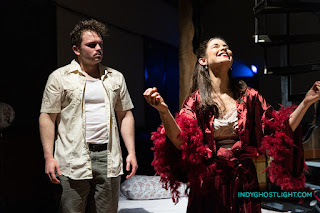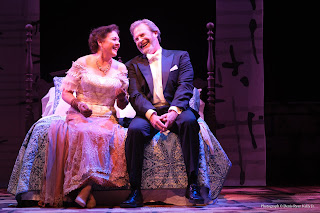Neighbors and strangers: Catalyst Repertory puts 'Streetcar' in our faces
 |
| Scents and sensibility: Stanley and Blanche confronting over perfume. |
Entering Indy Fringe's Basile Theatre between now and March 19 for a performance of "A Streetcar Named Desire" suggests that an experience much more intense and concentrated than you might have expected is about to be yours.
The compact space of a room with a capacity of 100 is dominated by a two-story set, with seating on three sides of the playing area. Tennessee Williams' prize-winning drama from more than seven decades ago is an unusual choice for Catalyst Repertory, an organization proclaiming its devotion to new work. When a production is this imaginative, however, and takes advantage of new modes of presentation, the departure has a way of underlining the company's mission.
Like most enduring theater, "Streetcar" hits upon aspects of social and personal relationships that cannot be confined to an era. New Orleans right after World War II, even when the story is as cunningly realized as this one is, presents an exotic setting, to begin with. In the grip of the Old South, New Orleans did diversity before diversity was cool. It brought to big-city life the expectations of village neighborliness, working across persistent ethnic divides.
Moreover, Williams' penchant for giving real life a patina (and sometimes a deeper layer or two) of dream life is fully engaged here as he registered a career-forging success. Sex roles are set and reconfirmed as military veterans, overwhelmingly men, come back to American factories and offices; women return to home life and a tendency that even the strongest of them can't resist of being dominated by men.
Casey Ross, the show's director, says in her program note that the suggestion of walls, interior and exterior alike, balances the evocation of a real world — a raffish neighborhood in New Orleans' French Quarter that the playwright ironically calls Elysian Fields — against the magic in which the play's distraught heroine places her fragile faith. So the spatial divisions are stunningly incomplete, partly to enable the action to be viewed from three sides, partly to emphasize the tentativeness with which reality imposes itself on the characters.
Blanche DuBois, sister of the woman sharing a downstairs apartment with her rough-hewn factory-worker husband, drifts into Stella's life in exile from the family plantation home in Laurel, Mississippi. As seen in Saturday night's performance, Sara Castillo Dandurand played Blanche on a steady plane of distraction and personal fantasy. But she was also attentive to the mood swings of this iconic character, who carries a personal burden of what amounts to sexual betrayal in addition to being overwhelmed by her family's decline and the difficulty of holding on to property as a woman bred to disdain practicality.
 |
| The DuBois sisters reconnect after a long time apart. |
Anna Himes as Stella has also had to make the kind of adjustment the times demand, though she has found the love of her life and accepts, with sometimes vehement misgivings, that as her husband Stanley Kowalski expects to maintain the upper hand. One of this production's most impressive achievements is how well, in the performance I saw, the sisters display a genuine bond, despite Stella's accommodation to her brutish husband while the distraught Blanche deepens her reliance on fantasy.
Ian McCabe exerted an animal force in the role. Inquisitive and skeptical about Blanche from the first, Stanley also displays an edgy intelligence that never accepts either sensible or socially imposed constraints. McCabe's performance was explosive; at close range, Stanley's outbursts were startling, and generated vivid responses from everyone around him, chiefly poker-playing friends and the two women he's forced to share living quarters with during one damp, sweltering summer.
The relationship between Stanley and Stella was given intense passion and detail. I was impressed at how these roles were precisely outlined with a wealth of gestures that matched their vocal expressions. Often you can see even well-delivered roles somewhat vague and busy when it comes to hands and arms. These two performances brought the same authenticity to what I saw as to what I heard.
At the physical extremes, the production is violent and daring, with an adroitness demanded of main characters on a set that, with little exaggeration, seems to have been inspired by the work of M.C. Escher. Kudos to Nick Kilgore's set design for being ultimately intelligible even though it must be constantly challenging for actors to work in. As a result, Kairon Bullock's lighting design necessarily involves more brightness than the play suggests, especially when ruled by Blanche's romance with the dark side of the spectrum. That insistence brings out Williams' most mesmerizing poetry, but safety must be given its own voice in a production with such spatial restrictions.
 |
| Mitch tries to deal with the truth about Blanche. |
Brian DeHeer was poignant as Blanche's desperate and eventually hostile suitor Mitch, one of the poker players, a man with his own burden of loneliness. That both attracts and repels Blanche, who insists she's still the desirable belle she always imagined herself as, and once came close to being, on the family estate, the exquisitely named Belle Reve.
As Eunice and Steve Hubbell, Audrey Stonerock and Matt Kraft are mirror images, somewhat more mildly drawn, of their downstairs tenants. They substantiate Williams' portrait of American sex roles, but from the less intense side, as Eunice seems to match her husband's need for domestic control. There seems to be an erotic charge to the spats of both couples, and this production looks that reality straight in the eye and presents it full-force.
The atmosphere is filled in, as Williams designed, by the wafting into Elysian Fields of the Quarter's music, represented in this production by singer Courtney Wiggins and pianist Dustin Klein, who also contributed original music to the show in Catalyst's partnership with Magic Thread Cabaret, of which he's the artistic director.
If this weren't such an assured production, the closeness of everything to the audience could generate more claustrophobia than insight, compassion, and pity. But the production is under such vital control that the story plays out within its own world, despite its energy being alarmingly tactile.
To take in Blanche's last line "I have always depended on the kindness of strangers" when it's yieldingly uttered only a few feet away can make you feel like one of those strangers, hoping to be kind in turn.
[Photos by Indy Ghost Light Photography]



Comments
Post a Comment